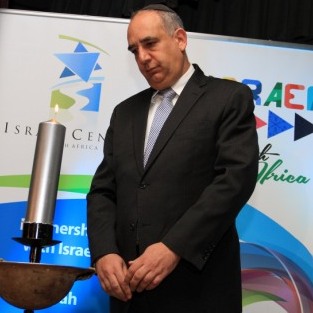
News

They gave their lives so that Israel may be free
DAVID SAKS
This year’s gathering, held on Yeshiva College campus in Glenhazel, was no exception, with an estimated 2 000 community members in attendance. The Sol Liebgott Hall was packed to capacity, with scores more seated or standing in the courtyard outside.
Of the more than 23 300 Israelis who have died in defence of the state or in terrorist attacks since 1948, 87 were of South African origin.
The guest speaker this year was Professor Shmuel Eidelman, who son, Ronen, was an officer in the elite Golani Brigade, and was killed at the head of his men during a fierce battle near Beirut Airport during the 1982 Lebanon War. Eidelman, born in South Africa to Lithuanian Jewish immigrants, qualified as a doctor at Wits in the mid-1950s and made aliyah shortly afterwards.
Addresses were also given by Chief Rabbi Warren Goldstein, Israeli Ambassador Arthur Lenk and SAZF Chairman Ben Swartz.
As in previous years, the ceremony featured the lighting of memorial candles for those who fell in each of Israel’s wars and through terrorism and intifadas, the sounding of the Last Post and the intoning of the Hazkara and Keil Malei Rachamim. Bnei Akiva’s Aharon Shemel, chairman of the SA Zionist Youth Council, was master of ceremonies for the proceedings.
Rabbi Goldstein based his theme on Aharon’s reaction to the tragic death of two of his sons, Nadav and Avihu, as recounted in the previous week’s parsha.
Tellingly, Aharon had simply remained silent. This silence implied an acceptance of the Divine decree together with an indication that in times of great sorrow, no words are possible.
Similarly, while words of remembrance and tribute to those who had made so great a sacrifice to preserve the Jewish State and its people, had to be spoken on such an occasion, it had also to be realised that ultimately no verbal expressions were sufficient.
With reference to Nadav and Avihu, the A-mighty stated that He was sanctified by those closest to Him, and into this awesomely elevated category also fell those who gave their lives to protect the Jewish people and their Holy Land.
Ambassador Lenk said the great success achieved by Israel had only been possible because of the men and women who were being honoured that night. Therefore the Jewish people need to continue to build a society that is worthy of their memory.
Lenk pointed to the horrific attacks on soldiers and civilians alike that were taking place across Israel’s borders. This, he said, starkly demonstrated what the consequences were of being without the kind of protection against terrorism that Israel was blessed with, through Tzahal.
Swartz said that world Jewry was blessed to be living at a time when the 2 000-year-old dream of once again being a free people in the Land of Israel was a glorious reality. This, however, had come at a huge price, which Jews living in Israel had to pay on a daily basis.
It was these Jews whose sons and daughters had fallen in defence of Jewry’s birthright and who faced existential threats to their very existence. In return, Diaspora Jews needed to show the strongest solidarity with the Jewish state and assist it in every way that they could.
Eidelman described himself as a representative of the families of the 87 former South African Jews who died to maintain “the dearest asset of the Jewish people, the State of Israel”.
He went on to describe the life of his deceased first-born son, Ronen, the esteem in which he was held by the men he led into battle and the example he set. Quoting David Ben-Gurion, he said that being a realist in Israel indeed meant having to believe in miracles, but alongside those miracles came much heart-breaking loss.
He expressed the hope that the miracles would continue, but that the people of Israel be spared further sorrows and tragedies.




